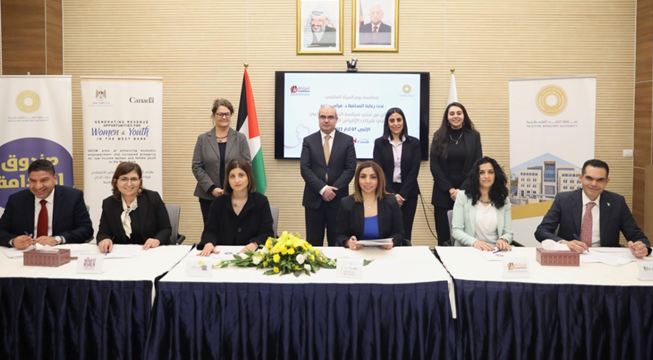
Ramallah/PNN/
Under the auspices of and participation of the Governor of Palestine Monetary Authority (PMA), Dr. Feras Milhem, and on the occasion of March 8 (International Women’s Day), the Palestinian Union for Small and Microfinance (Sharaka) and five Microfinance institutions (Faten, Asala, Acad, Reef, and Vitas) announced the adoption of a policy Gender, which aims to institutionalize and integrate gender issues as an original approach in lending companies, in an effort to achieve gender equality and address any gaps in this regard.
This came during an event hosted by the PMA today, with the participation of Ms. Catherine Palmier, Director of the Cooperation Program at the Canadian Representative Office, Ms. Safa' Abdel Rahman- Madi, Director of the Project of Creating Economic Opportunities for Women and Youth (GROW), and Ms. Rasha Al Qawasmi, Chairman of Sharaka Board of Directors, and in the presence of a number of Directors and representatives of microfinance institutions.
The PMA Governor welcomed the participants and attendees and extended his congratulations to the Palestinian women on the occasion of March 8 and thanked all the partner institutions that contributed to this achievement, represented by Sharaka and the GROW project, implemented by Cowater International, in partnership with the Ministry of National Economy, and with generous and grateful support from the Government of Canada. The PMA Governor also expressed his happiness with this achievement, which is a practical step in the field of enhancing financial inclusion for women, including financial education and training for them, with the aim of developing their projects and increasing their contribution to the national economy.
The governor said that the PMA facilitated the access of micro, small and medium enterprises led by women to financing through the Estidama Fund and benefiting from it and any similar funds or programs launched by the PMA and addressing any obstacles that prevent women entrepreneurs from benefiting from this opportunity. The percentage of female beneficiaries from this program was about 19%. It also launched the Monshati platform to provide capacity-building programs, consultancy, and technical support necessary for female entrepreneurs. The percentage of female beneficiaries of the platform's users was 38%. It also launched a regulatory sandbox to stimulate start-ups and owners of innovative ideas, especially including female entrepreneurs, to provide new financial technology solutions with a real positive impact on improving the level of digital financial services provided to users.
The governor added, “Work is currently underway to implement a field survey in mid-2022 to measure the development in financial inclusion, which includes developing an integrated gender roadmap with the aim of helping to reduce the gender gap related to the financial sector in terms of access, use and the level of financial capabilities of women. In 2021, the indicators of financial inclusion by gender showed that the percentage of adults owning a bank was 62% for males and 29% for females.”
The Governor indicated that today's event comes within the framework of memoranda of understanding signed by the PMA last year with four women's institutions - Including GROW - to expand the framework of work that achieves the desired goals for the purpose of empowering women entrepreneurs and rehabilitating them to break out of the cycle of poverty and integrate them into the labor market.
The Governor said that the PMA has formed a gender team from various departments, which will work to implement the action plan resulting from the audit from a gender perspective, which was conducted in cooperation with the UN Women, extending thanks and appreciation to them for their efforts and their continuous support.
In turn, Ms. Catherine Palmier said that the adoption of these new policies will promote more financial inclusion for women-owned businesses, and will enable them to raise capital, and it is an important step for any institution to establish or develop businesses, increase productivity, facilitate access to new markets, and introduce new technologies in its business, which will increase economic growth and create job opportunities.
Ms. Palmier emphasized the support of the cooperation program at the Canadian Representative Office to micro, small and medium enterprises to build their capacities, noting the significant role played by the financial sector in enabling these projects to grow and maintain their business.
As for Mrs. Safaa Abdel Rahman - Madi, she emphasized that the adoption of a "Sharaka Union" and five microfinance institutions for gender policy will promote the values of equality and justice and end the stereotype that hinders the advancement of women in society, which is the beginning of the recognition of gender equality as an approach that achieves commercial benefit for enterprises, companies and the national economy.
Ms. Safaa thanked the PMA for its permanent support for the women's sector and for facilitating their access to funding sources, especially by allocating a window within the Estidama Fund for loans targeting small business owners, especially women.
Ms. Rasha Al-Qawasmi confirmed the interest of the “Sharaka Union” and the microfinance institutions to implement the gender policy and integrate it into the internal policies in the financial sector as an essential step to contribute to achieving its objectives by empowering marginalized groups, especially women, providing a safe and supportive environment for them, and developing programs and products that meet their needs, allowing them the opportunity to decide their own way in choosing their businesses and their projects.
The event concluded with the representatives of the institutions signing the document of adopting the gender policy.